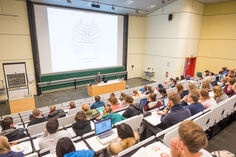- Studies
- Overview DFG-Projects
- Legal matters
- Data Protection
- Quality Management
- CTIS Management
- IT and Information Security
- Fees
- Meeting dates
- About us
- Contact
Application
Filing an application for research projects for which funding is to be requested from the Deutsche Forschungsgemeinschaft (DFG) corresponds to the regular application process of the Ethics Committee. However, there are a few aspects that regularly lead to delays and should, therefore, already be considered when preparing the documents.
General aspects
- Please plan enough time for the assessment of the study by the Ethics Committee. For an assessment of a Study according to Sec. 15 of the professional code for physicians ("Other Study"), at least one month should be planned, even if frequently less time is needed for the assessment.
- If possible, the statement of the Ethics Committee ("vote") should be included in the initial application to the DFG. If a certain deadline applies to filing a proposal with the DFG, you should, therefore, take the processing time of the Ethics Committee into account.
- Please get in touch with the office of the Ethics Committee early on, especially if the ethics statement is needed by a certain date or it is already foreseeable that the application can become complex. You will find the right person to contact in the area of our website regarding the various types of studies (Medicinal Products Medical Devices Sec. 15 Studies).
Formal aspects
The statement by the Ethics Committee will only be accepted without any problems by the DFG, if certain formal aspects have been complied with:
- It must be addressed to the applicant (of the DFG proposal).
- The title of the DFG proposal must coincide with the title on the statement by the Ethics Committee.
- The statement may not be older than two years.
(see: https://www.dfg.de/en/research-funding/proposal-funding-process/faq/faq-life-sciences)
So that these aspects are met, the following must be complied with when filing an application with the Ethics Committee:
- The principal investigator must be the applicant in the DFG proposal. If the DFG proposal has more than one main applicant, you should specify all main applicants in the cover letter to the Ethics Committee.
- In the study protocol and in all other documents (insofar as applicable) the title of the DFG proposal must be cited as the title of the study. The titles must be identical!
- The statement by the Ethics Committee must not be older than two years.
Fee settlement
The fee of the Ethics Committee will be absorbed by the DFG in the event a project is approved, insofar as this was requested. Therefore, when filing an application with the Ethics Committee, please indicate in the “Form for the Initial Application” that this is a research project with external funding, and please remember to also request absorption of the Ethics Committee fee (€1500) in the proposal made to the DFG (under “other funding” in the DFG proposal form). In case you do not request the fee for the Ethics Committee from the DFG or simply forgot to apply for it, the fee will have to be paid from your own funds. An application for fee reduction or remission is not possible in this case.
If the DFG proposal is not approved following the issue of the ethics statement, please submit the DFG notice of rejection to the Ethics Committee. Otherwise, the full fee will have to be paid here from your own funds.
Confirmation by the Chair of the Ethics Committee
The Ethics Committee is regularly asked for confirmation that a research project proposed to the DFG is ‘covered’ by an existing statement of the Ethics Committee. The Ethics Committee does not issue any such confirmation! There are various reasons for this:
- The Ethics Committee assumes that a research project which is being proposed to the DFG represents a new research project. Acc. to Sec. 15 (1) of the Professional Code of the State Medical Association of Baden-Wuerttemberg. physicians must receive professional advice (→ assessment of an Ethics Committee) on questions of professional ethics and professional conduct prior to participating in a research project. Separate professional advice must be received for every research project, as this advice is always specific to the project.
The circumstance that the same methods are being applied in two research projects or the same type of samples is being used or the same patient cohort is being examined, does not automatically mean that this is the same research project. - It is not feasible for the Ethics Committee to compare a DFG proposal with the documents of an older study due to capacity constraints.
Applications for Collaborative Research Centers (CRC)
The planning of Collaborative Research Centers (CRC) is already more complex than for individual DFG projects. As a rule, separate statements from the Ethics Committee responsible are expected by the DFG for every sub-project (and where appropriate, from various ethics committees, if collaboration partners are involved for whom the Ethics Committee Heidelberg isn’t responsible!). With an extensive CRC, it may be necessary to submit many parallel applications to the Ethics Committee. Therefore, the office of the Ethics Committee should be contacted as early as possible. As a rule, one employee of the office will act as the point of contact to coordinate the application. Moreover, it has proved to be beneficial in the past if one person also acts as the main point of contact regarding the application on the part of the applicants.
- Studies
- Overview DFG-Projects
- Legal matters
- Data Protection
- Quality Management
- CTIS Management
- IT and Information Security
- Fees
- Meeting dates
- About us
- Contact



![[Translate to English:] [Translate to English:]](/fileadmin/_processed_/9/b/csm_Firefly_Abstract_organic_flow_resembling_blood_vessels_shaped_as_a_tool__composed_of_glowing_651800_26778ea790.png)
